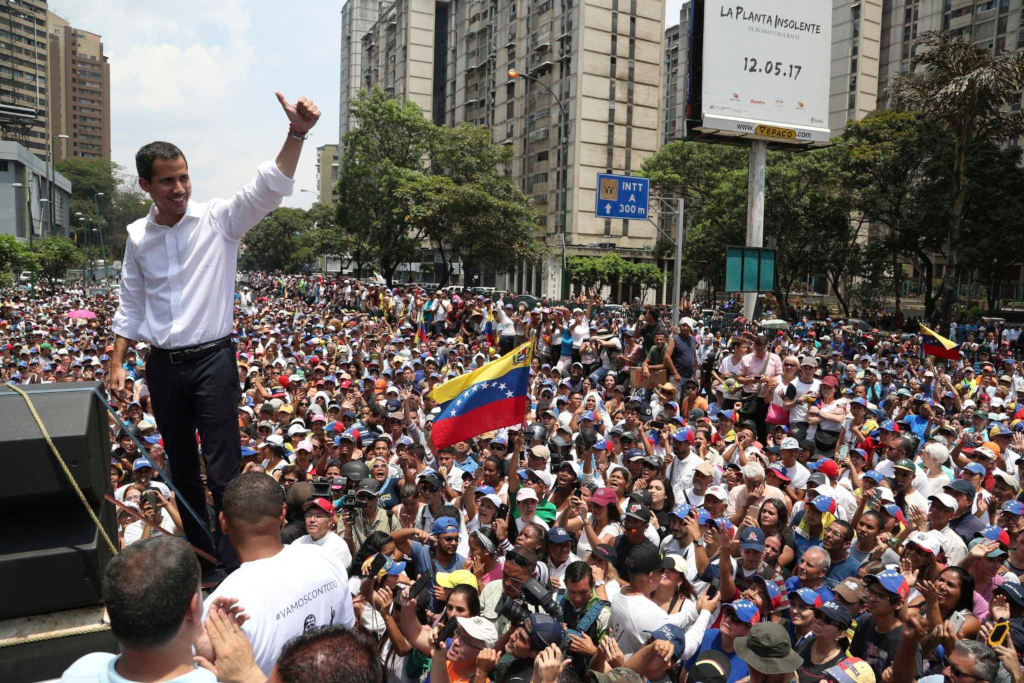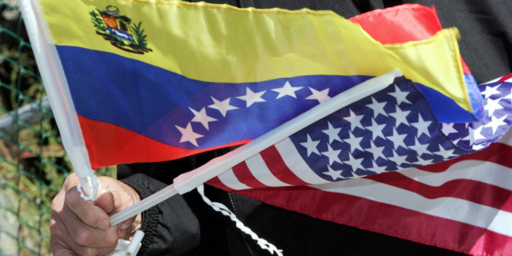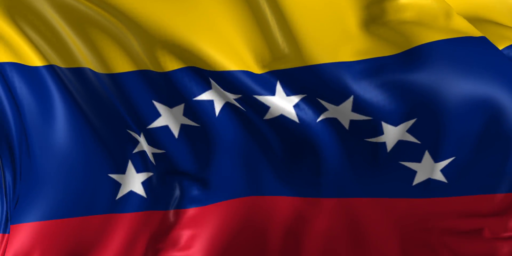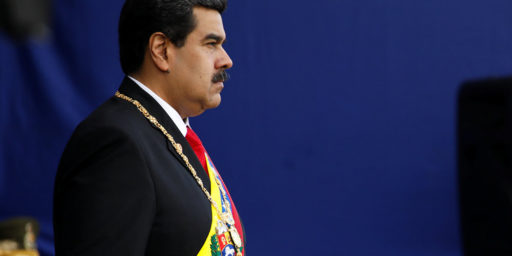The Venezuela Coup Attempt Has Failed
Lacking any real support from the military or police, the attempted coup against Nicolas Maduro has predictably failed.

The effort by Venezuelan opposition leaders to foment a rebellion within the military appears to have utterly failed, and that leads to the question of what happens next in the ongoing crisis:
For weeks, the Venezuelan opposition had been working on a comprehensive blueprint to finally force President Nicolás Maduro from office. Several of his top military and civilian aides were said to have been persuaded to switch sides, while others would be allowed to leave the country. There was a strong suggestion that Maduro himself might peacefully fly to Havana.
“They produced a pretty full plan,” a U.S. official said of the opposition. Implementation was tentatively set for Wednesday, although no date had been finalized.
On Monday, however, the plan started to fall apart.
Maduro, it seemed, had gotten wind of it, and opposition leader Juan Guaidó responded by rushing ahead. At dawn Tuesday, after alerting the U.S. State Department, Guaidó released a video saying that significant Venezuela military units were with him and that the moment had come to rise up against Maduro.
But after a day of bloody protests, the government remained intact. The Trump administration publicly blamed Russia and Cuba — Maduro’s top backers — for keeping him in place and discouraging expected high-level defections.
On Wednesday, as the United States and Russia traded barbs, the White House held an emergency meeting of top national security aides to mull next steps. “Significant progress on defense matters” was made, a senior administration official said.
Throughout the day, however, there were mixed messages about what role, if any, the U.S. military would play in Washington’s future efforts to resolve the Venezuelan crisis.
Secretary of State Mike Pompeo said that a peaceful resolution was still desired but that “military action is possible. If that’s what’s required, that’s what the United States will do,” he told Fox Business Network.
Asked if the U.S. military would be used to protect Guaidó, White House national security adviser John Bolton told MSNBC that President Trump “has been clear and concise on this point: All options are open. We want a peaceful transfer of power. But we are not going to see Guaidó mistreated by this regime.”
Top Pentagon officials emphasized nonmilitary options and said they had not been given orders to pre-position troops or prepare for conflict. “We’re obviously watching the situation very closely in Venezuela. The president’s made it clear that all options are on the table,” Gen. Joseph F. Dunford Jr., chairman of the Joint Chiefs of Staff, said in congressional testimony. “To date, most of our actions have been diplomatic and economic.”
Trump has shown little willingness to plunge into Venezuela, according to current and former aides, although he has already imposed sanctions on Cuba — which the administration has accused of controlling the Venezuelan military — and threatened more. Russia, the White House said in a statement late Wednesday, “must leave” Venezuela “and renounce their support of the Maduro regime.”
The president has occasionally mused to others that Bolton wants to get him into wars. Two advisers who have discussed Venezuela with him said Trump often brings up Florida politics, and his golf club in Doral, when talking about the subject. Both said Trump was unlikely to authorize any sort of long-term military action there.
At the same time, however, aides said he has given Bolton wide purview over Venezuela.
As he has pushed for a more aggressive policy, Bolton has angered some within and outside the White House. Even before Tuesday’s events, his staff clashed with Gen. Paul Selva, Dunford’s vice chairman, during a meeting to address the ongoing Venezuelan crisis, according to several officials with knowledge of the exchange.
The soft-spoken Air Force general was giving an update last week on the Pentagon’s view and making the case against a risky escalation by the United States when Bolton aides, including Mauricio Claver-Carone, Western Hemisphere director at the National Security Council, repeatedly interrupted and asked for military options, according to the officials.
Selva, irritated at the interruptions and confrontational style rather than the substance of any disagreement, slammed his hand down on the table, his ring hitting the wood with a sharp crack. Bolton deputy Charles Kupperman, who was chairing the meeting, adjourned the session earlier than planned, said the officials, who like others spoke on the condition of anonymity to discuss internal deliberations.
As I’ve observed for the past several days, it’s unlikely that any effort to topple Maduro can succeed unless it has the support of a significant portion of the Venezuelan military. The lack of such support in the past is what caused previous efforts against Maduro launched by small elements within the military and national police to die quickly and eventually only seemed to allow Maduro to identify untrustworthy elements within the military and thus eliminate potential threats to his hold on power. In that respect, this rebellion quickly fell into the same pattern that we’ve seen in Venezuela several times before. While there have been several attempts by some elements of the military to rebel against Maduro, and before him the late Hugo Chavez, those efforts were very small in scope and failed largely because the military, and most importantly its leadership, has remained loyal to Maduro. One of the reasons for this, of course, is because many of the top Generals in Venezuela now their positions to either Maduro or his predecessor Hugo Chavez and they have been defined by their political loyalty to the regime. Therefore, convincing them that they would be better off in a Venezuela where Maduro and his Chavist supporters are out of power is likely a difficult sell. Additionally, Maduro in particular been quite effective at purging the military, the national police, and the intelligence services of potential rivals for power or people who might be likely to side with the opposition. Finally, there have been no signs that the rank-and-file members of the military are at all inclined to disobey their commanders and come out in support of the rebellion.
Without this uprising from within the ranks of the military, or a decision by the leadership to withdraw support from the Maduro regime, no rebellion against Maduro is going to succeed unless there is some assistance from outside the country. In this respect, of course, eyes generally turn to the United States since we’re the only nation in the hemisphere with the resources to take on the Venezuelan military and overthrow the government. As I’ve argued in the past, though, such an action would be extremely counterproductive and, without the prior consent of Congress, utterly illegal. This means that the Venezuelan opposition is largely on its own and will likely fail unless it somehow manages to convince significant portions of the military to join them. If the past is any guide in this regard, that’s not likely to happen, and there certainly hasn’t been any sign in the past several days that this is going to happen. Instead, as we’ve seen in the past, Maduro is likely to use this as yet another opportunity to weed out of the leadership and the military itself any potential threats against him and his government.
At this point, the only question is what happens next. The street protests, which have flared up in Caracas and other major cities from time to time in the last several years, will likely continue but this isn’t going to be enough to dislodge Maduro from power. Indeed, as we get further and further away from what was likely to point at which this rebellion might have had a chance of succeeding, one has to wonder about the fate of Juan Guaidó and other opposition leaders. Will Maduro continue to tolerate their being relatively free to roam the country fomenting rebellion, or will he attempt to crack down by arresting and imprisoning them in connection with this rather obvious coup attempt? If there is a crackdown them Guaidó and his followers could end up being forced underground or into exile, where they will be far less effective leaders of an opposition that has yet to do what it needs to succed.




I’m really trying very hard not to say Keystone Koup, but Guaido et al. are not making it easy.
A coup is a hard thing to pull off. As I noted before, you need the military on your side, that’s why successful coups are often carried out by the military. Even then, you need to have most of it on your side, that’s why even coup attempts by the military often fail.
But, really, stirring up the people and begging the army to join your side, is very unlikely to succeed. This would be so even if the army were unhappy with the current leadership. The risks are huge, for one thing. But also conditions under the current leadership are known. Who knows what things will be like with new leadership.
So Trump pumped up Guaido but delivered only bluster and talk, and then was effortlessly brushed aside by the Russians? Why am I not surprised? And all this for a country that was already imploding. Why the hell is Trump going after Venezuela anyway. Republican officials run the range from hating brown people to being indifferent to their lives. What is the justification for getting involved in this fiasco?
Successful coups that do not have overwhelming support of the military, typically begin with a bullet to the head of the incumbent leader.
It is reasonable to assume that some US encouragement prompted Guaido to launch the coup attempt. Typically that channel would be the CIA, but under Tiny who knows which amateurs were involved, (Marco Rubio).
Why is Beto waving at a crowd of Venezuelans?
@MarkedMan:
Simple – Trump needs a war to make him look better. The lesson the GOP took to heart after 9/11 is that an incompetent President and shady government actions in plain sight tend to get a pass if we’re “defending freedom”. Grift, lies, gas-lighting and straight-up crimes that would normally piss off or horrify even conservatives get lost in the slog of breathless updates from the front.
Trump wanted to look all Presidential as he handled this Venezuela like a boss. Bet he was planing on bragging about how he got it done all quick and easy, not like those p^ssies Obama or Bush who took decades and couldn’t fix up Syria or Afghanistan or Iraq. He’s a fixer, that Trump dontcha know!!
Are we sure nobody showed him Wag the Dog and his demented brain misunderstood the whole concept?
Keystone Koup.
Sorry, but read the article at the link. Notable quote:
“So while the official line was that the uprising was the work of the Venezuelan masses, everything the Trump administration did reinforced the message that it had been made in Washington.”